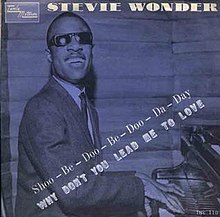

| "Shoo-Be-Doo-Be-Doo-Da-Day" | ||||
|---|---|---|---|---|
 | ||||
| SinglebyStevie Wonder | ||||
| from the album For Once in My Life | ||||
| B-side | "Why You Don't You Lead Me To Love"[1] | |||
| Released | April 30, 1968 | |||
| Recorded | 1968 | |||
| Genre |
| |||
| Length | 2:47 | |||
| Label | Tamla | |||
| Songwriter(s) |
| |||
| Producer(s) | Stevie Wonder | |||
| Stevie Wonder singles chronology | ||||
| ||||
"Shoo-Be-Doo-Be-Doo-Da-Day" is a 1968 single released by American and Motown recording artist Stevie Wonder. The song, co-written by Wonder and produced by Henry Cosby and Sylvia Moy, was the first to showcase Wonder's talents at the clavinet and was one of his first successful co-written tracks during his 1960s Motown period. The song reached number nine on the Billboard Hot 100 pop singles chart in 1968, and went to number one on the R&B chart.[2]
Billboard described the single as "a groovy rock number loaded with teen sales appeal."[3] Cash Box said it was a "delighting combination of Detroit and Gospel strains" with a "generally relaxed rock mood with snatches of fire from the ork build and outstanding vocal."[4]
"Shoo-Be-Doo-Be-Doo-Da-Day" was one of the first songs to use a clavinet in a popular music recording.[5]
| Chart (1968) | Peak position |
|---|---|
| U.S. Billboard Hot 100 | 9 |
| U.S. Billboard Hot Rhythm & Blues Singles | 1 |
This 1960s single-related article is a stub. You can help Wikipedia by expanding it. |